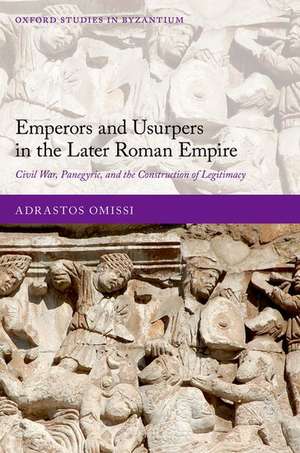Emperors and Usurpers in the Later Roman Empire: Civil War, Panegyric, and the Construction of Legitimacy: Oxford Studies in Byzantium
Autor Adrastos Omissien Limba Engleză Hardback – 17 iul 2018
| Toate formatele și edițiile | Preț | Express |
|---|---|---|
| Paperback (1) | 201.97 lei 31-37 zile | |
| OUP OXFORD – 30 iun 2020 | 201.97 lei 31-37 zile | |
| Hardback (1) | 718.32 lei 31-37 zile | |
| OUP OXFORD – 17 iul 2018 | 718.32 lei 31-37 zile |
Din seria Oxford Studies in Byzantium
- 34%
 Preț: 780.13 lei
Preț: 780.13 lei - 13%
 Preț: 533.06 lei
Preț: 533.06 lei - 17%
 Preț: 581.96 lei
Preț: 581.96 lei - 17%
 Preț: 581.58 lei
Preț: 581.58 lei - 19%
 Preț: 498.53 lei
Preț: 498.53 lei - 18%
 Preț: 573.24 lei
Preț: 573.24 lei - 30%
 Preț: 604.45 lei
Preț: 604.45 lei - 30%
 Preț: 542.02 lei
Preț: 542.02 lei - 30%
 Preț: 807.02 lei
Preț: 807.02 lei - 30%
 Preț: 1233.39 lei
Preț: 1233.39 lei - 30%
 Preț: 1099.29 lei
Preț: 1099.29 lei - 34%
 Preț: 1202.96 lei
Preț: 1202.96 lei - 34%
 Preț: 1127.39 lei
Preț: 1127.39 lei - 34%
 Preț: 997.67 lei
Preț: 997.67 lei - 34%
 Preț: 879.22 lei
Preț: 879.22 lei - 34%
 Preț: 759.52 lei
Preț: 759.52 lei - 27%
 Preț: 864.53 lei
Preț: 864.53 lei - 30%
 Preț: 615.10 lei
Preț: 615.10 lei - 30%
 Preț: 662.93 lei
Preț: 662.93 lei - 30%
 Preț: 926.16 lei
Preț: 926.16 lei - 30%
 Preț: 617.16 lei
Preț: 617.16 lei - 30%
 Preț: 588.33 lei
Preț: 588.33 lei - 30%
 Preț: 706.74 lei
Preț: 706.74 lei - 27%
 Preț: 880.01 lei
Preț: 880.01 lei - 30%
 Preț: 791.87 lei
Preț: 791.87 lei - 30%
 Preț: 736.88 lei
Preț: 736.88 lei - 30%
 Preț: 817.86 lei
Preț: 817.86 lei - 26%
 Preț: 701.54 lei
Preț: 701.54 lei - 12%
 Preț: 201.97 lei
Preț: 201.97 lei - 25%
 Preț: 584.15 lei
Preț: 584.15 lei - 26%
 Preț: 761.21 lei
Preț: 761.21 lei - 25%
 Preț: 578.04 lei
Preț: 578.04 lei - 16%
 Preț: 705.52 lei
Preț: 705.52 lei - 30%
 Preț: 604.14 lei
Preț: 604.14 lei
Preț: 718.32 lei
Preț vechi: 966.35 lei
-26% Nou
Puncte Express: 1077
Preț estimativ în valută:
137.46€ • 142.70$ • 114.62£
137.46€ • 142.70$ • 114.62£
Carte tipărită la comandă
Livrare economică 11-17 martie
Preluare comenzi: 021 569.72.76
Specificații
ISBN-13: 9780198824824
ISBN-10: 0198824823
Pagini: 370
Ilustrații: 6 black-and-white figures
Dimensiuni: 163 x 238 x 26 mm
Greutate: 0.69 kg
Editura: OUP OXFORD
Colecția OUP Oxford
Seria Oxford Studies in Byzantium
Locul publicării:Oxford, United Kingdom
ISBN-10: 0198824823
Pagini: 370
Ilustrații: 6 black-and-white figures
Dimensiuni: 163 x 238 x 26 mm
Greutate: 0.69 kg
Editura: OUP OXFORD
Colecția OUP Oxford
Seria Oxford Studies in Byzantium
Locul publicării:Oxford, United Kingdom
Recenzii
The book aims to grapple with the question of how imperial legitimacy was constructed in the late Roman world, using the genre of panegyric as the primary lens through which to shed light on the issue. The result is an illuminating study which will be required reading for anyone wanting to understand the political dynamics of the period and the role of panegyric in it.
This is an excellent first book. Omissi is deeply immersed in the source material and a sure guide to the scholarly landscape...A thesis rooted in a bilingual corpus of evidence that influences our picture of an entire century and problematizes our relationship with multiple ancient genres of writing - this is great history.
This is an excellent first book. Omissi is deeply immersed in the source material and a sure guide to the scholarly landscape...A thesis rooted in a bilingual corpus of evidence that influences our picture of an entire century and problematizes our relationship with multiple ancient genres of writing - this is great history.
Notă biografică
Adrastos Omissi grew up in Jersey, in the Channel Islands. From 2005, he studied at St John's College, Oxford, where he received his BA, MSt, and DPhil. After working for some years in the charities and green energy sector, he returned to Oxford in 2014 to take up a British Academy Postdoctoral Fellowship and a Junior Research Fellowship in Classics and Ancient History at Oriel College. He then spent a brief period as Lecturer in Ancient History both at Oriel and at Jesus College, during which time he was awarded a prestigious Humanities Division Teaching Award, before moving to the University of Glasgow in September 2017, where he is currently Lecturer in Latin Literature. He has authored a number of articles, in both specialist and non-specialist publications, on Roman history, linguistics, and Renaissance art.
